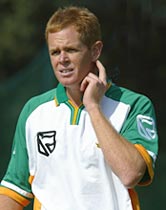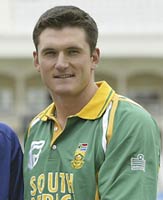Home > Cricket > Columns > Daniel Laidlaw
Proteas embark on new era
June 27, 2003
Spring is traditionally the time of rebirth, but it is the English summer in which one-time No. 1 aspirant South Africa, among others, are seeking a renaissance. After the latent post-Cronje malaise affecting South African cricket culminated in their unfortunate first-round elimination at the World Cup and subsequent axing of skipper Shaun Pollock, South Africa are in the usual position of having to restore their credibility and prove themselves again -- in both forms of the game.
 This is a time of transition and transformation for several sides. A remarkable five teams have changed captains in at least one form of the game in the three months since the World Cup, underlining how fortunes have increasingly come to be measured by performance at the quadrennial tournament, and South Africa, still nominally the world No. 2, are embarking on a new era.
This is a time of transition and transformation for several sides. A remarkable five teams have changed captains in at least one form of the game in the three months since the World Cup, underlining how fortunes have increasingly come to be measured by performance at the quadrennial tournament, and South Africa, still nominally the world No. 2, are embarking on a new era.
The retirement of stalwarts Allan Donald and Jonty Rhodes, the appointment of Graeme Smith as captain and the ousting of Lance Klusener is significant in that it places greater distance between South Africa's leadership group and the spectre of Hansie Cronje.
Prior to the World Cup, Donald and Rhodes extraordinarily announced they would be dedicating their tournaments to Cronje. While this was likely a mark of a respect to a departed friend, it was also symptomatic of the disturbing insularity which characterises South African cricket, and its apparent failure to come to terms with Cronje's corruption and what this meant for the game.
There is little likelihood such an embarrassing dedication would be tolerated by new captain Smith, who said in a recent interview that he never met Cronje, was not influenced by him, and is open in his ambition to be a new leader for a new era. Similarly, one could not imagine the mealy-mouthed Pollock possessing the inclination or authority to publicly name a long-time team-mate as a disruptive influence, as Smith did of Klusener. "That needed saying," Smith claimed in a Guardian interview.
In many ways, Pollock has been a victim of circumstance. When Cronje's corruption was exposed in April 2000, Pollock was thrust into the invidious position of transitional leader. Despite appearing to handle the traumatic changeover smoothly, the conservative Pollock could not provide South Africa, apparently still pining for their much-loved former leader, with a new identity. He was Cronje Mk II, only without the charisma and devotion that Cronje reputedly commanded. It is not that Pollock fared badly -- indeed, his statistical record is impressive -- it's just that he did not do anything particularly well. South Africa beat the teams they were supposed to beat, often convincingly, but without playing an especially attractive brand of cricket.
Confronted with the defining challenge of his captaincy, consecutive Test series against Australia in 2001/'02, Pollock's South Africa fell way short of the mark, their shortcomings woefully exposed. Considered by some to be legitimate challengers to Australia's crown, they were never in the contest against a rampant, confident Australia, beaten 3-0 Down Under and 2-1 at home, including the second-largest defeat in Test history in the first Test at Johannesburg.
Apparently placing themselves under enormous pressure, South Africa's bowling lacked penetration, their batting crumbled and Pollock led unimaginatively, before missing the return series with a side injury. Whatever the official ratings would later say, South Africa were further away from their goal of becoming the best side in the world than at any point since re-admission.
Team unity cannot have been aided during that time by political interference -- a seemingly ever-present distraction for a team in transformation -- by what increasingly appeared an incompetent administration. Batsman Jacques Rudolph was to have made his debut in the third Test at Sydney in January 2002, only for UCB President Percy Sonn to veto the team to ensure Justin Ontong played instead. One can imagine the affect this must have had on all parties concerned; currently ostracised fast bowler Nantie Hayward has claimed there is no communication between players and selectors.
South Africa's mauling prompted the UCB to hold a workshop of past and present players and administrators, and led to the establishment of a National Cricket Committee to examine the pressing issues. "We want a plan in place to win the World Cup and to set up a process that would take cricket beyond the tournament," said CEO Gerald Majola in an April 2002 media release. "We want to make South Africa the number one side in the world." Everything, however, appeared geared towards winning the all-important home World Cup, and apart from the sacking of the selectors and coach Graham Ford in June, South Africa continued on as before.
For all their problems and the uninspired cricket they played at the tournament, with a little more luck (and correct interpretation of the Duckworth/Lewis print-outs) South Africa could have made the World Cup semifinals. If Pollock was sacked on the basis of failure at the World Cup alone, then it was extremely harsh. However, it was as if reality had belatedly caught up, and Pollock was demoted despite winning his previous five Tests and boasting a one-day win ratio of 65.73 per cent (Steve Waugh 65.24%).
 The appointment of 22-year-old eight-Test veteran Graeme Smith as his replacement, not even originally part of the World Cup squad, was a bold step, though not totally shocking. Smith impressed with his toughness in his debut series against Australia, has since scored hundreds against Bangladesh and Pakistan and, perhaps unlike Pollock, openly covets the position. Kallis and Gibbs surely would not have met the character requirements, and vice-captain Boucher said he would have turned the job down. There were few other options.
The appointment of 22-year-old eight-Test veteran Graeme Smith as his replacement, not even originally part of the World Cup squad, was a bold step, though not totally shocking. Smith impressed with his toughness in his debut series against Australia, has since scored hundreds against Bangladesh and Pakistan and, perhaps unlike Pollock, openly covets the position. Kallis and Gibbs surely would not have met the character requirements, and vice-captain Boucher said he would have turned the job down. There were few other options.
The only question is whether Smith can lead. Since gaining the job, he has fast become the most outspoken captain in international cricket, branding Klusener disruptive, calling Bob Woolmer a liar and being remarkably open in his ambitions. Smith has said more in three months than his predecessor did in three years.
South Africa's tour of England should provide an early indication of whether Smith is an impertinent youngster yet to earn the right to be as brazen as he has, or whether he is just the single-minded character South Africa needs to get back on track, irrespective of age and experience. Having no ties with Cronje, Smith should not be bound by conservatism as Pollock was, while still having Pollock's experience to lean upon.
In the toughest battles, South Africa's frailty has as often as not lain in their approach to the game rather than the calibre of their players. While the lack of quality support behind Pollock and Ntini may expose them in England, Smith has the opportunity, indeed the obligation, to take a fresh and uninhibited approach.
He has led boldly off the field, now it remains to be seen whether he can do the same on it.